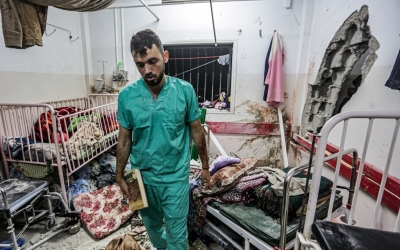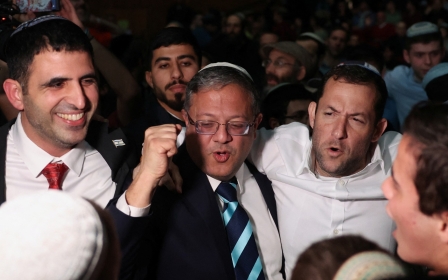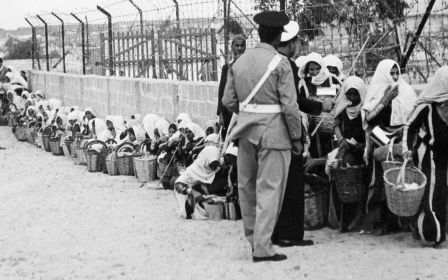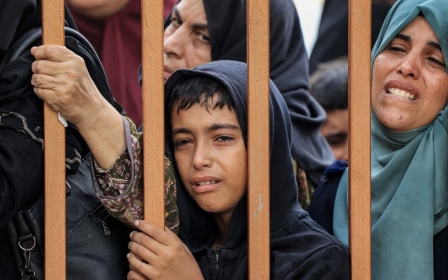Mustaribeen: The Israeli undercover agents with a history of dressing like Palestinians
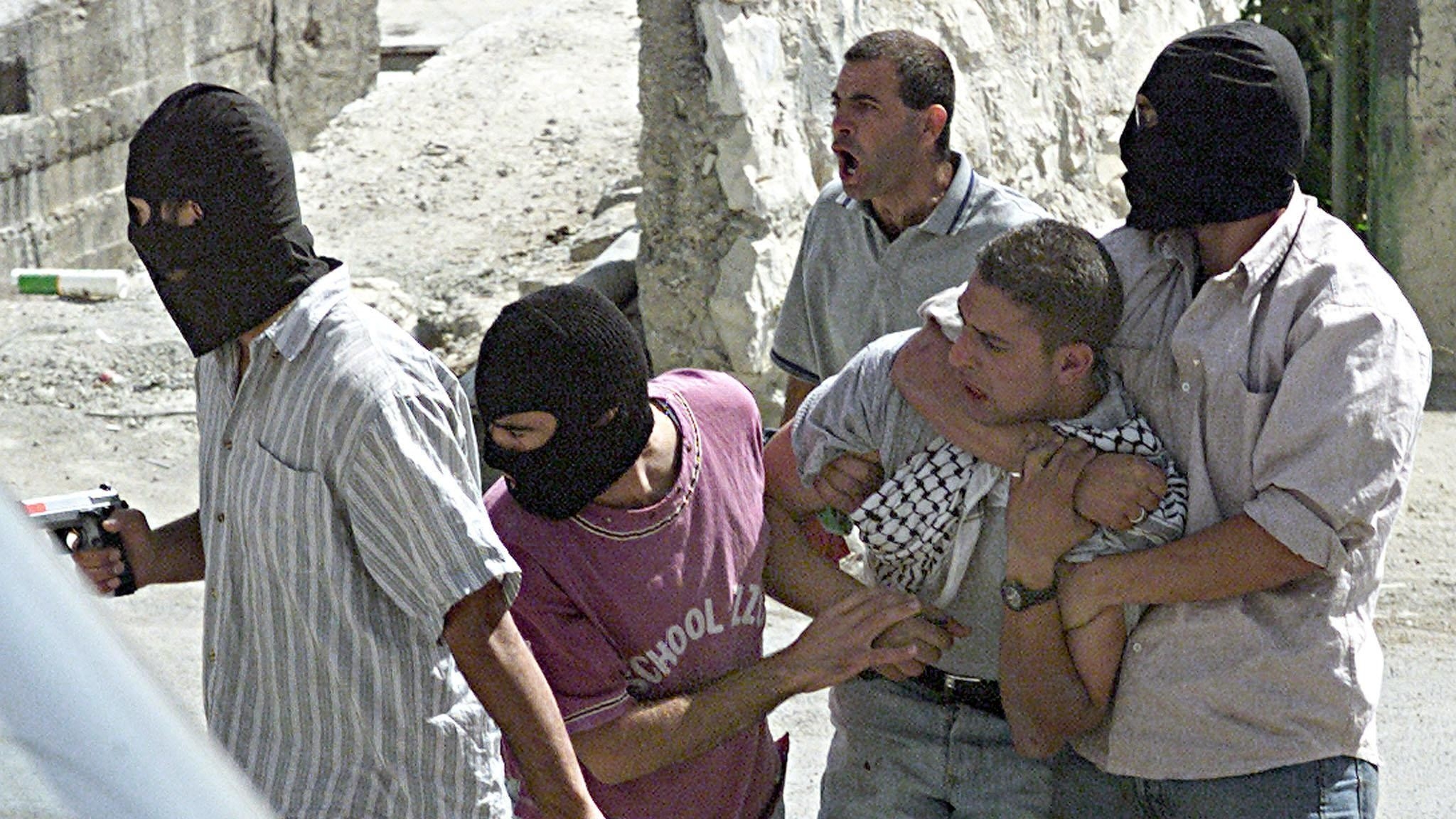
Dressed in medical scrubs, Islamic thobes and hijabs, wearing face masks and pushing wheelchairs, a group of Israeli undercover agents descended upon Jenin's Ibn Sina Hospital on Tuesday.
The agents are known in Arabic as mustaribeen, which means to "dress and act like an Arab", and in Hebrew as mistaarivim, a derivative of the Arabic word.
The operatives - disguised as Palestinian medics, patients and civilians - raided the facility in the occupied West Bank, killing three people. One of the Israeli officers reportedly spoke in Arabic during the operation.
The raid took place at 5:30am, and took around 10 minutes, according to Israeli media.
The special forces involved were the latest in a long history of undercover Israeli agents pretending to be Palestinian.
New MEE newsletter: Jerusalem Dispatch
Sign up to get the latest insights and analysis on Israel-Palestine, alongside Turkey Unpacked and other MEE newsletters
Their existence goes as far back as the British Mandate of Palestine in the first half of the 20th century, during which British authorities worked with Zionist militias to infiltrate Arab populations in the region.
"Mistaarivim started as an undercover unit in the Palmach division, which was part of the terrorist militia of Haganah, the core of the Israeli army," Emad Moussa, a researcher specialising in political psychology in Israel and Palestine, told Middle East Eye.
"They were made up of mainly Mizrahi Jews, coming from Arabic-speaking countries, and were tasked to infiltrate Palestinians (and other Arabs in neighbouring countries) to collect information for the Zionist movement and the British."
That unit was eventually disbanded, particularly after tensions arose between British authorities and the Zionist militias they had once propped up.
At the end of the Mandate and following the creation of Israel, the undercover unit was revived as a means of espionage, and to sow seeds of chaos and confusion in Palestinian communities.
'Agent provocateurs'
One of the most well-known units, the Duvdevan, was formed in the 1980s by former Israeli prime minister Ehud Barak. The unit is still operational today, and one of several undercover Israeli units.
Follow Middle East Eye's live coverage of the Israel-Palestine war
"Their use during the first intifada was particularly prominent. They were often either Druze, or Arabic-speaking Jewish operatives of Shin Bet," Laleh Khalili, an academic and researcher at the University of Exeter, told MEE.
"[They] collected intelligence, acted as agent provocateurs, or managed to push themselves into protests or gatherings in order to arrest or injure or assassinate Palestinians from inside."
Today, the undercover agents are found in the West Bank and occupied East Jerusalem - but not in Gaza.
"In Gaza, the mistaarivim units lost much of their operational capabilities after Hamas had taken control of the Strip in 2007," said Moussa.
"For mistaarivim to operate in Gaza is to risk being captured and then hidden away well beyond the reach of the Israeli army."
In the West Bank, the units are most often seen infiltrating protests against Israeli occupation, attempting to create fear and paranoia among Palestinians.
They also get directly involved in carrying out arrests, including during mass protests in December 2017 when then-US president Donald Trump's administration unilaterally decided to recognise Jerusalem as Israel's capital.
Violence and brutality
The agents can be found in Israel too. Palestinian activists have reported being confronted by the mustaribeen in cities like Haifa, where they have earned a reputation of violence and brutality.
In recent years, Palestinians have employed several tactics to identify and fight back against the mustaribeen.
That includes wearing light colours and tucking their tops into their trousers: the undercover officers tend to wear darker colours and looser clothing to hide weapons.
Moussa said that protesters also organise themselves in smaller groups to avoid being captured by agents, and also share information on social media about suspicious individuals.
"I was told, those undercover units are sometimes recognised because they try to look and act 'too Palestinian'," he said.
Khalili added: "More often than not, Palestinians can with a bit of attention spot them. But often they are intervening in incredibly heated moments of protest where Palestinians' attention is elsewhere."
West Bank raids
The mustaribeen don't just carry out arrests; they have been known to shoot and kill Palestinians, too.
In May 2021, they shot and killed Ahmed Fahd, 24, a civilian who lived in al-Amari refugee camp in Ramallah.
'Those undercover units are sometimes recognised because they try to look and act 'too Palestinian''
- Emad Moussa, researcher
Israeli intelligence officials later called his family to apologise, stating they had meant to kill his brother and uncle accused of being involved in "terror activities".
Increasingly, Israeli military raids on West Bank towns and cities - which now almost occur on a daily basis - involve mustaribeen elements.
Earlier this month, the Israeli army carried out a two-day raid on the city of Tulkarm, killing eight Palestinians, which it said involved "forces from the army, border guards, mustaribeen, and the general security service".
These undercover units, backed by regular armed forces, operate differently to agents at protests.
"What happened in Jenin today is an operation of a different calibre. It combines military superiority and infiltration. The thing is, even if those units are recognised, they're heavily armed and supported by Israeli military units," said Moussa.
"Therefore, most people don't stand a chance of confronting them."
This article is available in French on Middle East Eye French edition.
Middle East Eye delivers independent and unrivalled coverage and analysis of the Middle East, North Africa and beyond. To learn more about republishing this content and the associated fees, please fill out this form. More about MEE can be found here.


